12 Best Practices for Healthy Oral | Tooth loss Prevention Techniques…
Hello dear all,
Welcome to ForajCreations, A distinct and reliable Health blogging website that provides exceptional value to your overall well-being.
Today we will talk about What are the best practices that can prevent plaque, tartar, infection, bruxism and tooth loss.
☆ Have a query related to healthy oral?
☆ How to keep your oral hygiene, so that you don’t face any tooth-related diseases?
= Now, Just Sit back! relaxed and just read this post entirely! Today, we will cover a wealth of information related to oral hygiene.
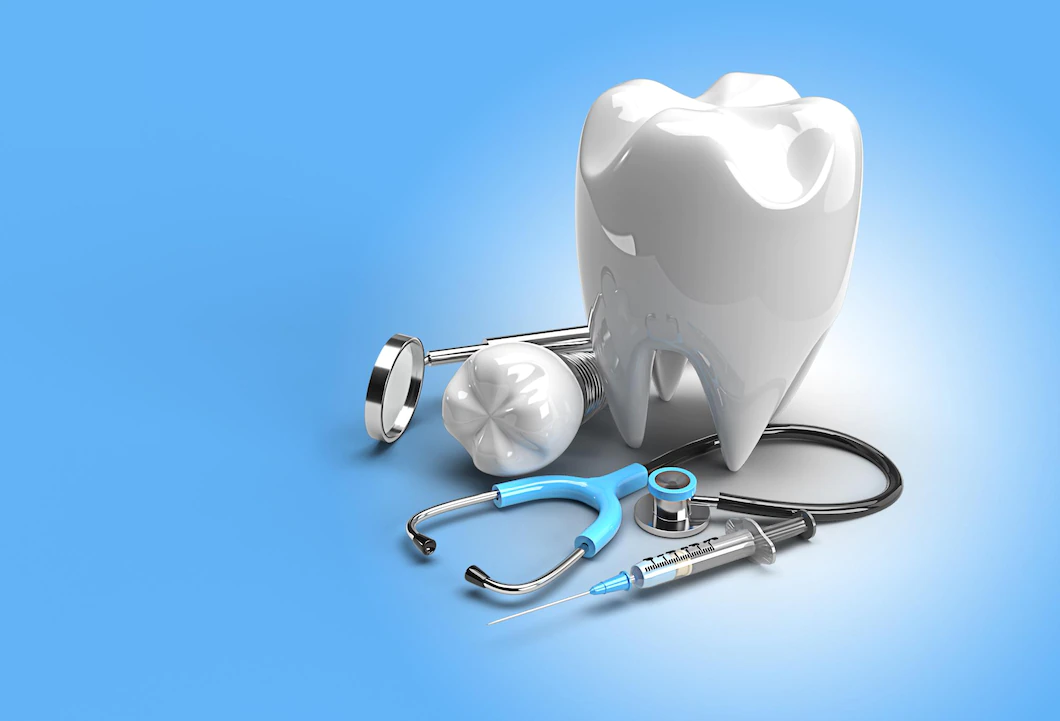
》Interesting Introduction:-
Oral hygiene is more than just brushing and flossing your teeth daily In today’s fast-paced world it’s common to forget about daily oral hygiene maintenance.
Due to busy schedules, many individuals neglect oral hygiene and resulting in various dental issues, just as plaque and tartar buildup, abscesses, infections, bruxism, cavities, gum disease, tooth decay and many more.
By devoting just 5 – 10 minutes per day to practising good oral hygiene, you can significantly improve your dental and overall oral health and resolve any related problems effectively.
This post highlights the best practices and habits that can enhance the health of your tooth.
By adopting some basic techniques and applying the tips provided below, you can give your teeth the extra care they need.
On the other hand, good oral hygiene habits can not only prevent these issues but also promote healthy teeth, fresh breath and a confident smile.
By prioritizing oral hygiene we can ensure that our mouths and bodies will stay healthy and happy.
☆ Interesting facts:-
1. The first toothbrush was made from tree twigs. The ancient Egyptian, Greek and Romans used frayed twigs to clean their teeth.
2. Synthetic nylon bristles were introduced in
1930, before animal hair is used as bristles like horse hair and boar bristles.
3. Tooth enamel is the hardest thing in the body even harder than bones.
4. Saliva plays an important role in oral hygiene maintenance by washing away food stuck in the tooth and neutralising acids in the mouth.
5. Poor oral hygiene increases the chance of gum disease by 50% over the age of 30.
6. Oral health issues are linked to several others health problems like heart disease, diabetes and stroke.
7. Flossing daily can help to a year of life expectancy to your tooth.
8. Regular dental checkups and cleanups are crucial for treating and maintaining good oral hygiene. ( Recommended Dental check is 2 times per year)
12 Best Practices for Healthy Oral Tips…
》What are oral hygiene practices:-
Healthy Oral hygiene practices refer to routine care and maintenance of the mouth, teeth and gums to protect them from bad odour, tooth pain, tooth decay, gum disease, infection, bruxism and abscesses etc…
Healthy oral hygiene habits are very necessary for maintaining healthy teeth and gums and promoting overall health and well-being.

》Linked Complications:-
Research shows that there are many complications linked to poor oral hygiene maintenance and that are included:
– Complications in pregnancy like premature birth, and low baby weight.
– Diabetes.
– Endocarditis (Infection to your inner heart lining)
– Stroke.
– Cardiovascular disease.
– Pneumonia.
☆ Below are the health complications that can impact oral health.
– Diabetes.
– Osteoporosis.
– AIDS/HIV.
– Alzheimer’s disease.
》Best Practices for Healthy Oral Tips| Tooth loss Prevention Techniques.
Here are the best and most effective habits or practices that make your overall oral health well.
01. Before bed clean your tooth:-
02. Brush properly:-
03. Use mouthwash:-
04. Chew sugar-free gums:-
05. Limit intake of sugar:-
06. Floss once per two days:-
07. Quit Smoking:-
08. Proper diet:-
09. Use soft bristles brush:-
10. Wearing mouthguards:-
11. Drink more water:-
12. Used Flouride based toothpaste:-
☆ Lets, Understand properly…
01. Before bed clean your tooth:-
It is not necessary to say that we all have to clean our teeth two times a day.
Recommended time for brushing is at the wake-up time and the other is when you go to bed.
Most people forget to clean their teeth at night but brushing before bed gets rid of germs and plaque that build up throughout the day.
When you consider healthy gums and teeth then we all have to use soft bristles brushes. Medium or harder bristles can damage the gums.
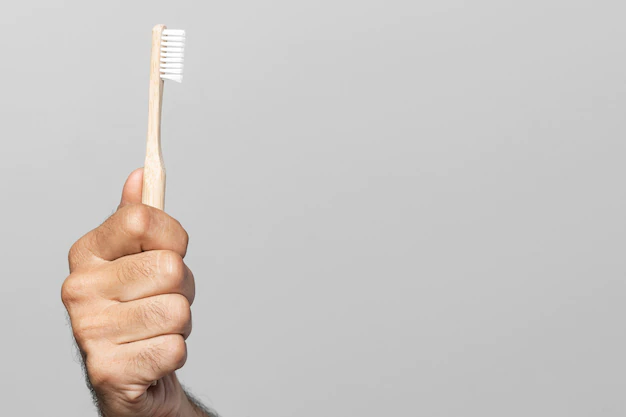
☆ How to brush properly:-
It’s necessary to know how to brush properly as it allows safe and healthy gums.
Take your time moving the toothbrush gently and in a circular motion to remove plaque.
The unremoved plaque will be harder and build up tartar which can remove by dentists.
02. Cleanup your tongue:-
Plaque not only buildup up on tooth gums but it can build up on your tongue.
It will lead to bad odour and oral health problems.
So don’t forget to clean your tongue using tongue leaners.
The surface of your tongue can accumulate bacteria, food particles and dead cells, which can contribute to bad breath and poor oral health.
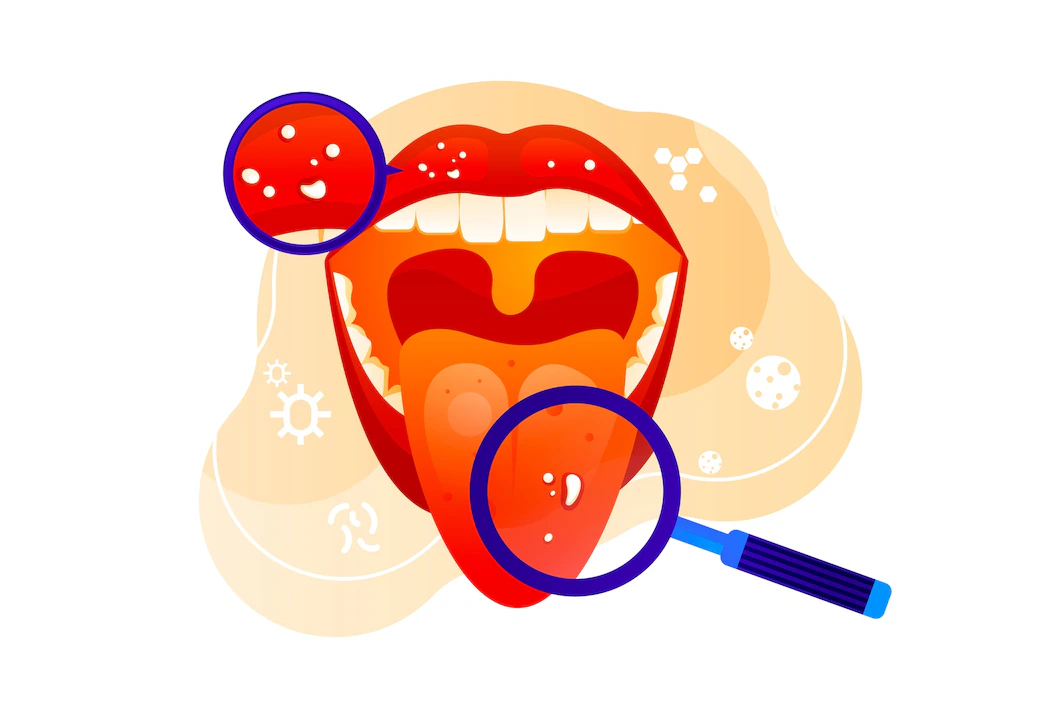
The tongue cleaners are a tool which can scrap your tongue to remove plaque, dead cells and food particles.
Alternatively, you can use the backside of the toothbrush to clean up your tongue.
03. Use mouthwash:-
The use of mouthwash is necessary because whenever we brush our teeth it may be possible that our brush cannot clean ‘hard to brush’ areas of our teeth.
So here if you clean your mouth with mouthwash then it will be helpful to maintain Healthy oral.
☆ Mouthwash works in these three Categories.
– Mouthwash can balance the acids in the mouth.
– Cleans hard-to-brush areas by removing plaque.
– It can re-mineralize your teeth.
04. Chew sugar-free gums:-
This tip is for specialists who have suffered from the acids in the mouth after meals.
Chewing sugar-free gums after meals can increase the saliva flow and can regulate the acids in the mouth that can cause to have gum disease and erode the enamel of the tooth.
05. Limit intake of sugar:-
When you consume sugar it will become particular acids which can promote eroding of the enamel of the tooth and ultimately it will lead to cavities.
And that’s why, what our parents say about eating chocolate can lead to tooth pain and cavities.
So you have to consume limited sugary foods like dairy products, chocolate, teas, coffee and acidic fruits.
You also have to avoid the intake of sugary drinks like cola, soda and other sugary drinks.
06. Floss once per two days:-
Flossing is a good fir healthy oral hygiene practice, it involves using a thin string or pick to clean between the teeth and remove plaque and food particles that can lead to cavities, gum disease and bad breath.
To floss effectively break up 18 inches of floss and wind most of it around one of the middle fingers.
Hold the remaining floss tightly between the thumb and index finger and gently insert it between the teeth.
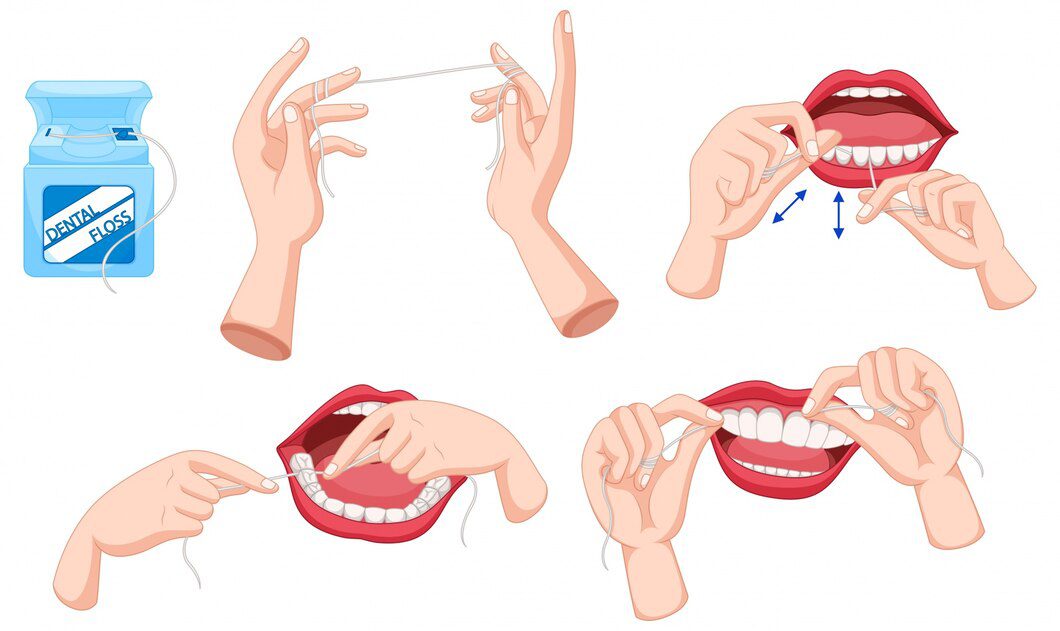
Curve the floss around each tooth and slide it up and down to remove food particles and plaque between your teeth.
Recommended flossing is once per day but if you are sure about your teeth and nothing is stuck in between your teeth then you can floss according to your schedule once per two days is great for your teeth.
07. Quit Smoking:-
According to ‘The Centers for Disease Control And Prevention‘ smoking can make a person more susceptible to gum disease as it weakens the immune system.
Smoking and tobacco uses are one of the major factors which promote gum disease, oral cancer and overall oral health.
Quitting smoking is one of the best things you can do for your oral hygiene maintenance.
Smoking weakens the immune system which is essential for fighting infection so it is necessary to quit Smoking.
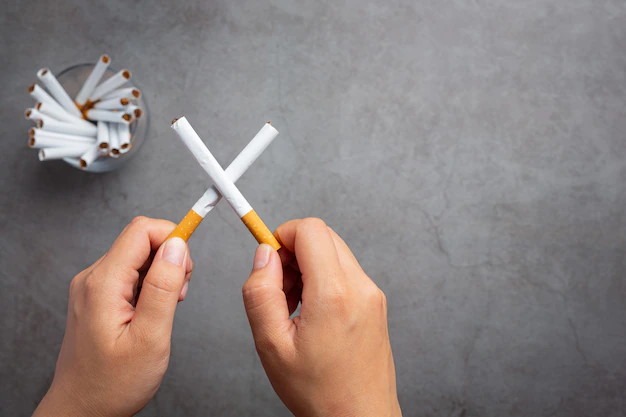
08. Proper diet:-
What a person eats directly affects the teeth and gums, and most disease occurs due to eating specific foods.
Some of the foods that a person should incorporate to prevent gum disease and tooth decay.
☆ Food to take:-
- – High-fibre foods and vegetables, as they can help to clean your mouth.
- – Black tea and green tea, help to reduce bacteria.
- – Dairy products like milk, cheese, and yoghurt help to increase saliva production.
- – Food that contains Flouride with water.
- – Calcium-rich foods as it is necessary for teeth and bones.
☆ Food to avoid:-
- – Sugary & starchy foods and drinks.
- – Acidic foods.
- – Hard to eat food.
- – Alcohol.
- – Carbonated drinks.
09. Use soft bristles brush:-
Soft brushes and bristles are normally recommended by dental specialists as it smooth but effective to clean plaque and food particles.
Your toothbrush doesn’t show an expiry date but You can use any brush for 3-4 months, after please replace it with a new soft brush for your tooth cleaning.
When choosing to toothbrush also check the size and shape according to your mouth as it should be comfortable to use
Soft bristles help to maintain the cleanness of your oral and help to maintain the health of your gums.
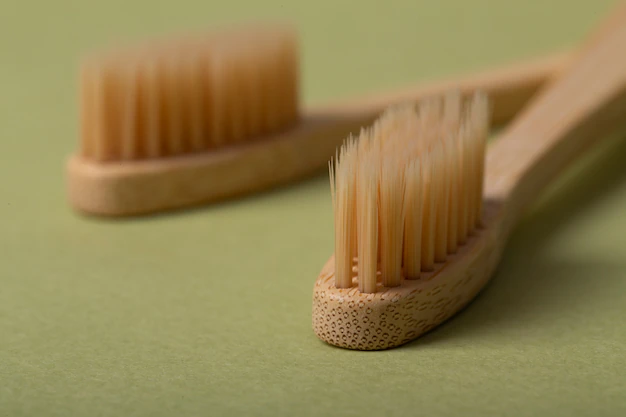
10. Wearing mouthguards:-
Mouth guards are devices that can help to protect the teeth from grinding and injury during any physical activity and it is essential for sports persons and person who has a habit to grind their teeth during sleep.
Custom-fitted mouthguards are the most useful and very comfortable to use.
11. Drink more water:-
Drinking water is very good for maintaining overall health but it is also helpful to maintain oral health.
Drinking water after meals can wash away the food particles and fresh plaque that can be very beneficial for oral hygiene practices.
It is very necessary because it hydrates the gums and dehydration can dry the gums and it will lead to gum disease.
It will also help you increase saliva production.
12. Used Flouride based toothpaste:-
Using Flouride based toothpaste is an essential aspect of maintaining overall Healthy oral.
Here are the reasons why you should use Flouride based toothpaste:
– Fluoride is a mineral and can harden the outer side of the tooth.
– It can effectively reduce the production of acids which leads to tooth decay.
– it is widely available and comfortable to use.
– It is safe for daily use.
》Risk factors:-
Several risk factors can contribute to getting gum disease over time.
Like Aging that cant be controlled by a person.
According to “The American Academy Of Periodontology” these are the risk factor which can increase the chances of getting gum disease.
– Poor diet.
– Obesity.
– Teeth grinding.
– Genetic.
– Stress.
– Smoking.
– Tobacco use.
– Certain medications like antidepressants and heart medications.
So, This is all about best practices that can be used to maintain Healthy oral.
》Wind-Up Words:-
Proper Oral hygiene is very important for maintaining good oral and dental health.
The Mainly practices include daily brushing and flossing to keep your gums and teeth nice to look and healthy.
Healthy oral practices include limiting sugary foods, chewing sugar-free gum, mouthwash and visiting dental specialists regularly.
These practices help to keep your tooth strong, promote good health of your gums and protect from infection, bacteria and bad breath.
Subscribe to our blog post for further updates and the latest blog posts related to your Physical health, Mental health and Personal development.
We hope that you are deriving numerous benefits from our blog.
Be healthy!
Be happy!
Thank you…
Visit again…
••••••••••••••》ForajCreation《••••••••••••••••